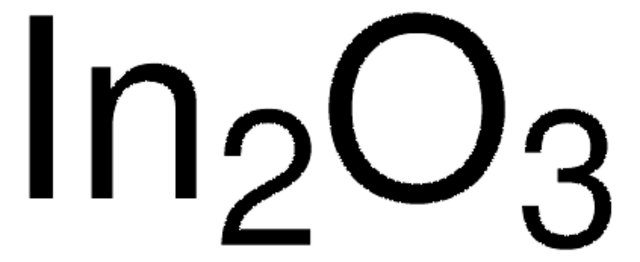639303
Indium tin oxide coated PET
surface resistivity 60 Ω/sq, L × W × thickness 1 ft × 1 ft × 5 mil, sheet
Synonyme(s) :
ITO-PET, Polyethylene terephthalate film, ITO coated
About This Item
Produits recommandés
Forme
sheet
Résistivité superficielle
60 Ω/sq
L × l × épaisseur
1 ft × 1 ft × 5 mil
Transmittance
550 nm, >78%
Chaîne SMILES
O=[In]O[In]=O.O=[Sn]=O
InChI
1S/2In.5O.Sn
Clé InChI
LNNWKAUHKIHCKO-UHFFFAOYSA-N
Vous recherchez des produits similaires ? Visite Guide de comparaison des produits
Description générale
Application
Micro mechanical properties of ITO-PET were investigated. Electrical resistance of ITO-PET increases in case of degradation. ITO-PET was used as an electrode in the electrochemical measurements in a study of biosensors composed of polymer brushes. ITO microelectrodes were studied as an “electronic tongue” for analyte recognition. The sheet resistance of ITO, after bending to a radius of 25 mm was investigated, for its use for flexible optical devices. Giant unilamellar vesicle (GUVs) were produced on ITO coated glass slides by drying droplets of the FhuA proteoliposomes.
Caractéristiques et avantages
Propriétés physiques
Quantité
Code de la classe de stockage
13 - Non Combustible Solids
Classe de danger pour l'eau (WGK)
WGK 3
Point d'éclair (°F)
Not applicable
Point d'éclair (°C)
Not applicable
Équipement de protection individuelle
dust mask type N95 (US), Eyeshields, Gloves
Faites votre choix parmi les versions les plus récentes :
Déjà en possession de ce produit ?
Retrouvez la documentation relative aux produits que vous avez récemment achetés dans la Bibliothèque de documents.
Articles
Organic Semiconductor Laser Materials
Organic photovoltaics (OPVs) represent a low-cost, lightweight, and scalable alternative to conventional solar cells. While significant progress has been made in the development of conventional bulk heterojunction cells, new approaches are required to achieve the performance and stability necessary to enable commercially successful OPVs.
A transparent conductive electrode (TCE) is an essential component of various optoelectronic devices such as solar cells, liquid-crystal displays (LCD), light-emitting diodes (LED), and touch screens.
Recent progress in the area of solution-processed functional materials has led to the development of a variety of thin-film optoelectronic devices with significant promise in the industrial and consumer electronics fields.
Notre équipe de scientifiques dispose d'une expérience dans tous les secteurs de la recherche, notamment en sciences de la vie, science des matériaux, synthèse chimique, chromatographie, analyse et dans de nombreux autres domaines..
Contacter notre Service technique




